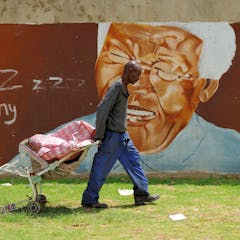
Articles on Planetary boundaries
Displaying 1 - 20 of 26 articles

Most of the problems confronting the world come down to population growth. But where women are given the choice, they limit the number of children they have.

We’ve become so good at using the Earth’s resources we’re endangering the systems we rely on.

Access to fossil fuels allowed humanity to overshoot Earth’s biophysical limits. The crises we now face are all symptoms of this overshoot, and the only fix is to cut our demands on the biosphere.

We’ve blown past the safe and just limit for vital Earth systems, from climate change to the biosphere and the use of fertilisers and freshwater. For humans to thrive means living in safe limits

Human civilisation is headed for collapse. Collectively, we are pushing planet Earth beyond the limits of endurance. There has to be a better way. Now a new book makes the case for systemic change.

There’s more to sustainability than net zero. Using green ammonia for fuel and as a way to transport hydrogen could add to nitrogen pollution that already exceeds safe planetary boundaries.

Mountaineer and scientist Will Steffen said climbing was similar to science: “That’s the buzz you get in science when you solve a big problem and suddenly see how it all fits together”

Why countries need to shift what their citizens eat, and what the optimum diet for our planet might be. Listen to The Conversation Weekly podcast.

‘Green water’ is essential for healthy soils and a benign climate, but it’s under threat.

For the first time, we calculated Australia’s share of planetary environmental boundaries and found we’ve shot past three already.

A global treaty on plastic pollution must incentivize a take-make-reuse waste management system and include quantitative targets based on geography-specific emissions.

The production and release of synthetic chemicals worldwide is destabilising the Earth system.

Humanity’s biggest challenges are not technical, but social, economic, political and behavioural. Effective actions are still possible to stabilise the climate and the planet, but must be taken now.

Our species has far exceeded its fair share of the planetary bounty, and Brown is right to call for the global population to peak.

Reducing our intake of discretionary foods such as cakes, biscuits, pizza and hot chips is the best way we can make our diets more sustainable.

COVID-19 has brought to the fore the interdependency of business and society. It’s time for amendments to the social contract that underlies societal support for business.

Ecosystem deterioration, along with climate change, is now becoming a controversial political question.

The first step is admitting we have a problem, but what should come next to protect the planet?

You could take the bus to work, or eat less meat. But how do you know if your efforts are making a difference? A new approach aims to break global environmental budgets down into digestible chunks.

New research finds a sustainable food system is possible but will require huge global changes.
